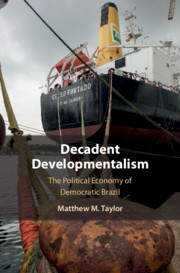Book contents
- Decadent Developmentalism
- Decadent Developmentalism
- Copyright page
- Dedication
- Contents
- Figures
- Tables
- Acknowledgments
- Abbreviations
- 1 Introduction
- Part I Complementarities in the Economic Sphere
- Part II Economic, Legal, and Political Control of the Developmental State
- 5 Coalitional Presidentialism and Defensive Parochialism
- 6 Rents, Control, and Reciprocity
- 7 The Autonomous Bureaucracy and Incremental Change
- 8 Conclusion
- Notes
- References
- Index
6 - Rents, Control, and Reciprocity
from Part II - Economic, Legal, and Political Control of the Developmental State
Published online by Cambridge University Press: 04 November 2020
- Decadent Developmentalism
- Decadent Developmentalism
- Copyright page
- Dedication
- Contents
- Figures
- Tables
- Acknowledgments
- Abbreviations
- 1 Introduction
- Part I Complementarities in the Economic Sphere
- Part II Economic, Legal, and Political Control of the Developmental State
- 5 Coalitional Presidentialism and Defensive Parochialism
- 6 Rents, Control, and Reciprocity
- 7 The Autonomous Bureaucracy and Incremental Change
- 8 Conclusion
- Notes
- References
- Index
Summary
Developmental states must be politically strong to design, implement, and recalibrate developmental strategies. They must have the capacity to provide rents to firms that nudge them up the innovation frontier, as well as to demand reciprocity, or returns on those rents. Achieving these goals requires effective instruments of control. Analyzing four developmental programs undertaken by various governments during the 1985 to 2018 period – the Manaus free trade zone, the automotive regime, the ethanol program and the Greater Brazil Plan – this chapter demonstrates the endemic weakness of controls. The Brazilian developmental state was ineffective at controlling rents in ways that channeled business energies in strategically productive long-term directions. The causes of weak control included political factors associated with the coalitional presidential system and the weakness of checks and balances, bureaucratic factors such as the fragmentation of oversight, economic factors such as incumbent firm influence, and judicial factors such as the toothless policing of illicit links between firms, the developmental state apparatus, and the political realm.
Keywords
- Type
- Chapter
- Information
- Decadent DevelopmentalismThe Political Economy of Democratic Brazil, pp. 157 - 193Publisher: Cambridge University PressPrint publication year: 2020

